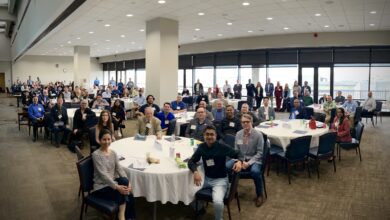
At a recent Internet Society event in Washington, D.C., a review of the policy role played by the International Telecommunications Union (ITU) network policy quickly turned into a discussion of the internal issues facing that organization. A budget badly out of balance. A decrepit headquarters building that is preventing the ITU from dealing with key policy issues. While this discussion regularly strayed into gossip and raw speculation, they somehow underscored a basic truth of the Internet age, the idea that no organization is capable of handling all the issues created by global networks, the principle that all network policy groups have to rely on the support of their peers.
The event, hosted by the D.C. chapter of the Internet Society, was billed as a Recap of the recent ITU Plenipotentiary. That plenipotentiary, which met from 20 October to 7 November, was held in Busan Korea. The Internet Society asked a panel of four individuals to give their impressions of the plenipotentiary. They were Fiona Alexander, an Associate Administrator at the National Telecommunciations and Information Administration, Leslie Martinkovics, the Director of International Public Policy at Verizon, and Carolina Rossini, the Vice President for International Policy and Strategy, at Public Knowledge. The group was moderated by the Vice President of Global Public Policy Development at The Internet Society, Sally Wentworth.
At the start of the meeting, the panel quickly discussed the ITU’s position on Internet governance. In particular, they discussed the ITU on multistakeholderism. Mutlistakeholderism, a somewhat awkward term, is the concept that any governance of the Internet should have representatives from four distinct groups of stakeholders: nation states, private corporations, the technical community, and non-profits that are promoting civil society. Multistakeholderism is the official policy of the United States government. However, this idea has been rejected by the ITU. In December 2012, the ITU took the position that the Internet should be controlled by representatives of nation states alone.
At the recent plenipotentiary, the ITU showed signs that it was shifting its stance on the idea of multistakeholderism. All the members of the Internet Society panel agreed that the ITU had moved much more supportive of the idea of multistakeholderism than it had been in the past. “Considerable improvement” was how one member of the panel described the discussions at the ITU meeting.
After talking about multistakeholderism, the panel presented their views on other discussions that occurred in Busan. Some of these discussions dealt with important ideas. Most dealt with issues of regional concerns. Perhaps the notable issue was that of counterfeit devices on the web. Increasingly, regional networks are having more and more trouble with counterfeit devices, most notably mobile phones, which are pretending to be something other than what they are. Since most of these devices are being used for criminal acts or to disrupt civil institutions, they have become a concern of many governments. In its plenipotentiary, the ITU started considering policies to address such devices.
Yet, the discussion quickly turned to the ITU budget. This issue, raised by a member of the audience, suggested that the ITU was not able to fund all its activities and might soon not be able to support even its core services. During the plenipotentiary, the ITU released a budget that showed that it had a $200 million shortfall. Furthermore, it increased that deficit by voting to initiate several new projects. One audience member argued that the ITU was being irresponsible. Under similar circumstances, she noted, any private organization would take steps to cut projects and reduce their budgets. “Right-size the organization” was the phrase she repeated.
The discussions of ITU internal issues did not end with the budget. The panel quickly turned to the problem of the ITU headquarters building, a complex that is apparently in poor shape, badly suited to the needs of the organization, and in need of substantial repair. One member noted that the building was actually limiting what the ITU staff could do and the kinds of problems that they could address.
Budgets and buildings and other internal ITU issues consumed far to much of the panel discussion. Near the end of the presentation, one panelist admitted, with a proper amount of chagrin, that they were talking about things that were entirely beyond their control. In making that admission, she got close to the great truth of the Internet age. The ITU, she said was “part of a network” and needs to learn to rely more on its neighbors than in doing everything itself.
Indeed, if the Internet has taught us anything in the 20+ years, it has shown how we dwell in a nexus with our neighbors and how we reply on them more than we might appreciate. While networks have allowed individual organizations to flatten their internal structures and consolidate control in a small number of people, it has provided us with ample evidence that a single set of leaders cannot run everything, networks are often more powerful than large hierarchies, and that we can benefit when we learn to rely on our neighbors.
Yet, we also know that we don’t naturally reply on our neighbors and that we are still developing the tools and structures that allow us to trust others, to see when they have completed their obligations to us, and to set an agenda for the common good. Certainly, the discussion of the internal ills of the ITU suggested that this organization believes, as much as any group can, that it should be the single institution that deals with Internet policy, and that it doesn’t want to trust any part of the agenda to others, even if such an approach puts the organization itself at risk.
Such were the lessons of an Internet Society event that was advertised as a discussion of ITU policy. It indeed started with policy, quickly moved into gossip, and finally offered nothing more than unfiltered opinions before returning to the original topic of policy. Yet this event may have offered a more honest assessment of the ITU than a more disciplined policy analysis. It may have showed that the ITU, like the rest of us, is struggling to learn how to make the most of a networked world.






